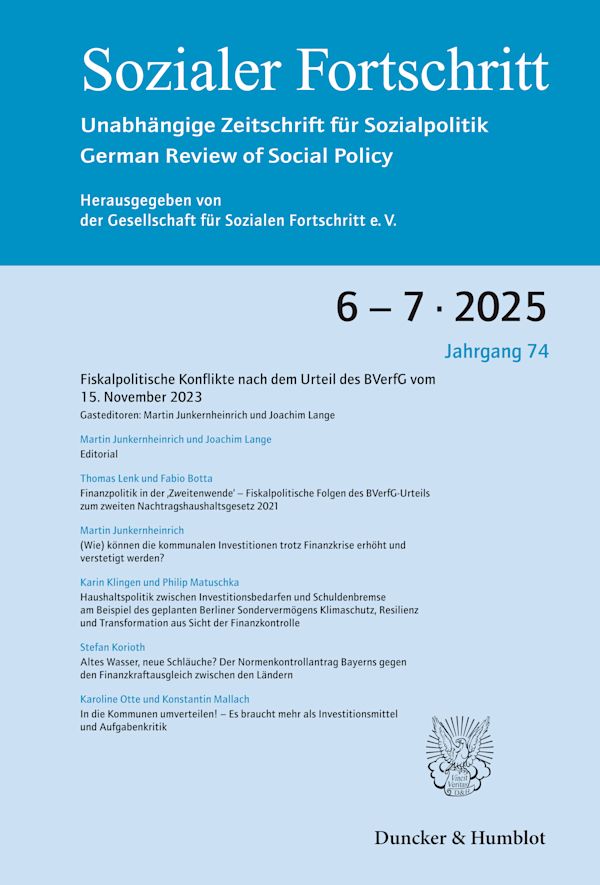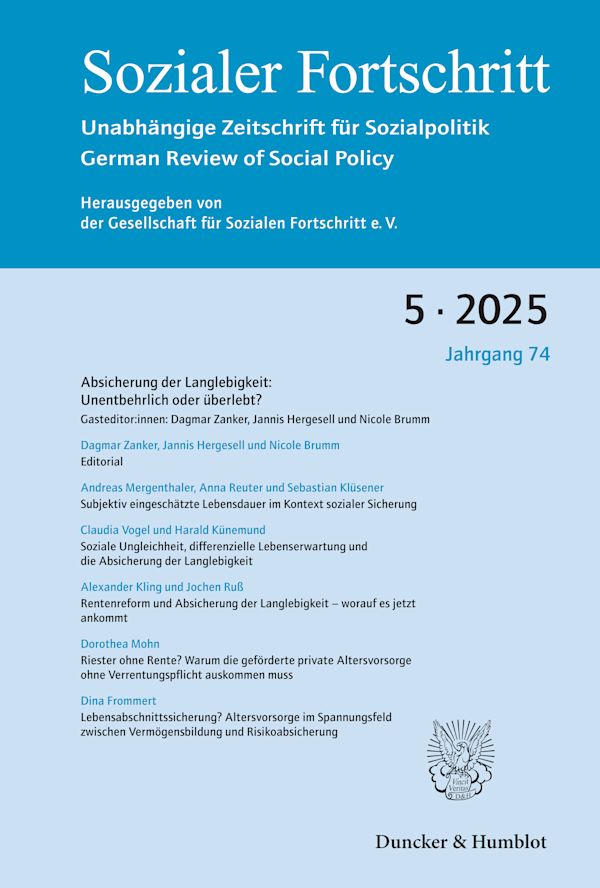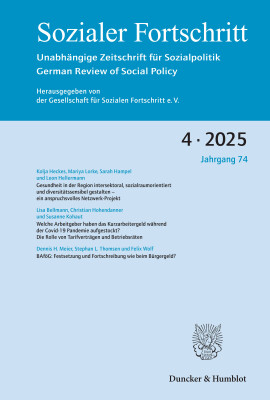Über die Zeitschrift
Jeden Monat liefert die Fachzeitschrift „Sozialer Fortschritt“ Informationen, Analysen und Reformvorschläge zum gesamten Spektrum der Sozialpolitik. Nicht nur die „großen“ Themen der aktuellen Diskussion werden kritisch beleuchtet – ein wichtiges Anliegen ist es auch, diejenigen Bereiche der Sozialpolitik zu thematisieren, die sonst häufig untergehen oder sich in sehr spezialisierten Zeitschriften wiederfinden.
mehr lesen
Neben den Beiträgen aus Wissenschaft und Praxis zu aktuellen Themen bietet der „Soziale Fortschritt“ auch ein Forum für längere wissenschaftliche Analysen und Reformvorschläge, die sich mit den Grundlagen der Sozialpolitik und der sozialen Sicherung befassen. Hier wurden und werden wichtige Impulse für die Weiterentwicklung der Sozialpolitik gegeben. Als Service für ihre Leser bündelt die Zeitschrift zunehmend einzelne Themen zu Schwerpunktheften, in denen sich dann mehrere Beiträge z. B. mit der Gesundheitspolitik, der Rentenreform oder der Familienpolitik auseinander setzen.
Zu den Autor/inn/en gehören sowohl namhafte Wissenschaftler/inn/en aus dem Bereich der Sozialpolitik als auch viele Fachleute, die in der Praxis Sozialpolitik „machen“. Ein besonderes Anliegen der Zeitschrift ist es, jungen Autor/inn/en eine Möglichkeit zu geben, ihre Analysen und Vorschläge einer breiten Öffentlichkeit vorzustellen.
Netzwerk SoGeZ!
Die Fachzeitschrift „Sozialer Fortschritt“ ist Teil des Netzwerks für sozial- und geisteswissenschaftliche Zeitschriften SoGeZ!
Das Netzwerk SoGeZ! wurde 2022 gegründet zum Austausch und zur Vernetzung sozial- und geisteswissenschaftlicher Zeitschriftenredaktionen, zur Sichtbarmachung der redaktionellen Arbeit in der Wissenschaft und zur Etablierung nachhaltiger Finanzierungs- und Unterstützungsstrukturen für wissenschaftliche Zeitschriften. Redaktionen leisten einen wesentlichen Beitrag zum wissenschaftlichen Diskurs, indem sie die Qualität und Zugänglichkeit wissenschaftlicher Publikationen sicherstellen.
SoGeZ! will dieses Bewusstsein stärken und gemeinsam mit den Redaktionen langfristig bessere Arbeitsstandards schaffen.

Bezugsquelle
Verlag Duncker & Humblot GmbH
Carl-Heinrich-Becker-Weg 9
12165 Berlin
ISSN 0038–690X (Print). Erscheint monatlich.
ISSN 1865–5386 (Online)
Jahresabonnement (inkl. Online-Zugang):
- für Institutionen mit Online-Zugang für eine unbegrenzte Nutzerzahl an einem Standort € 268,-
- für Privatpersonen mit einem personengebundenen Einzelzugang € 129,90
- für Studenten (gegen Vorlage eine Nachweises) 25 % Ermäßigung auf den Abonnentenpreis für Privatpersonen
- Einzelhefte (ohne Online-Zugang) kosten € 39,90.
Alle Preisangaben sind unverbindliche Preisempfehlungen und verstehen sich zzgl. Versandkosten.
Bestellungen können über jede Buchhandlung oder direkt an den Verlag gerichtet werden. Abbestellungen müssen 6 Wochen vor Jahresende erfolgen.
Online First Publications / Open Access
Für eine Online First-Veröffentlichung wird keine Gebühr erhoben. Der Beitrag ist in der eLibrary (https://elibrary.duncker-humblot.com/) des Verlages Duncker & Humblot für Abonnent:innen vorab verfügbar und wird zu einem späteren Zeitpunkt in einer Print-Ausgabe veröffentlicht.
Open-Access-Veröffentlichung:
Für eine Open-Access-Veröffentlichung erhebt der Verlag Duncker & Humblot eine Gebühr pro Beitrag. Die Liste der Gebühren ist unter diesem Link einzusehen: https://www.duncker-humblot.de/c‑579. Allgemeine Informationen zu Open-Access hat der Verlag hier gelistet: https://www.duncker-humblot.de/services/open-access/open-access-fuer-zeitschriftenartikel/c‑735.
Der/die Autor:in sollte außerdem eine CC BY-Lizenz auswählen; der Verlag bietet dafür zwei Alternativen an: https://www.duncker-humblot.de/services-open-access/open-access-fuer-zeitschriftenartikel/c‑735.
Hinweis zum Begutachtungsverfahren
Alle eingereichten Beiträge unterliegen einem Double-Blind-Peer-Review-Verfahren. Damit wird die wissenschaftliche Qualitätssicherung gewährleistet und die Anschlussfähigkeit der Publikationen an nationale wie internationale Standards gesichert. Durch das Double-Blind-Peer-Review-Verfahren wird die Anerkennung eingereichter Publikationen im Rahmen entsprechender Promotionsverfahren sichergestellt.
Die Zeitschrift Sozialer Fortschritt ermutigt Early Career Researcher ausdrücklich zur Einreichung ihrer Arbeiten.
Hinweise für Autor:innen
Hier finden Sie Informationen und Hinweise für Autor:innen für einzureichende Manuskripte.
Autor:innen haben ferner die Möglichkeit – bei Veröffentlichung im Sozialen Fortschritt – ein kostenfreies Jahresabonnement auszufüllen, welches mit dem Heft startet, in dem der/die Autor:in veröffentlicht hat.
Publication Ethics and Publication Malpractice Statement
Our publication ethics and publication malpractice statement is mainly based on the Code of Conduct and Best-Practice Guidelines for Journal Editors (Committee on Publication Ethics, 2011, see http://publicationethics.org/files/Code_of_conduct_for_journal_editors_Mar11.pdf).
Editors’ responsibilities
Publication decisions
The editor is responsible for deciding which of the papers submitted to the journal will be published. The editor will evaluate manuscripts without regard to the authors’ race, gender, sexual orientation, religious belief, ethnic origin, citizenship, or political philosophy. The decision will be based on the paper’s importance, originality and clarity, and the study’s validity and its relevance to the journal’s scope. Current legal requirements regarding libel, copyright infringement, and plagiarism should also be considered.
Confidentiality
The editor and any editorial staff must not disclose any information about a submitted manuscript to anyone other than the corresponding author, reviewers, potential reviewers, other editorial advisers, and the publisher, as appropriate.
Disclosure and conflicts of interest
Unpublished materials disclosed in a submitted paper will not be used by the editor or the members of the editorial board for their own research purposes without the author’s explicit written consent.
Reviewers’ responsibilities
Contribution to editorial decisions
The peer-reviewing process assists the editor and the editorial board in making editorial decisions and may also serve the author in improving the paper.
Promptness
Any selected referee who feels unqualified to review the research reported in a manuscript or knows that its prompt review will be impossible should notify the editor and withdraw from the review process.
Confidentiality
Any manuscripts received for review must be treated as confidential documents. They must not be disclosed to or discussed with others except as authorized by the editor.
Standards of objectivity
Reviews should be conducted objectively. Personal criticism of the author is inappropriate. Referees should express their views clearly with supporting arguments.
Acknowledgement of sources
Reviewers should identify cases in which relevant published work referred to in the paper has not been cited in the reference section. They should point out whether observations or arguments derived from other publications are accompanied by the respective source. Reviewers will notify the editor of any substantial similarity or overlap between the manuscript under consideration and any other published paper of which they have personal knowledge.
Disclosure and conflict of interest
Privileged information or ideas obtained through peer review must be kept confidential and not used for personal advantage. Reviewers should not consider manuscripts in which they have conflicts of interest resulting from competitive, collaborative, or other relationships or connections with any of the authors, companies, or institutions associated with the papers.
Authors’ duties
Reporting standards
Authors of original research reports should present an accurate account of the work performed as well as an objective discussion of its significance. Underlying data should be represented accurately in the paper. A paper should contain sufficient detail and references to permit others to replicate the work. Fraudulent or knowingly inaccurate statements constitute unethical behavior and are unacceptable.
Data access and retention
Authors could be asked to provide the raw data of their study together with the paper for editorial review and should be prepared to make the data publicly available if practicable. In any event, authors should ensure accessibility of such data to other competent professionals for at least ten years after publication (preferably via an institutional or subject-based data repository or other data center), provided that the confidentiality of the participants can be protected and legal rights concerning proprietary data do not preclude their release.
Originality, plagiarism and acknowledgement of sources
Authors will submit only entirely original works, and will appropriately cite or quote the work and/or words of others. Publications that have been influential in determining the nature of the reported work should also be cited.
Multiple, redundant or concurrent publication
In general, papers describing essentially the same research should not be published in more than one journal. Submitting the same paper to more than one journal constitutes unethical publishing behavior and is unacceptable.
Manuscripts which have been published as copyrighted material elsewhere cannot be submitted. In addition, manuscripts under review by the journal should not be resubmitted to copyrighted publications. However, by submitting a manuscript, the author(s) retain the rights to the published material. In case of publication all articles, images and any other parts of the publication are copyright reserved. Any usage out of the narrow limits of the copyright law requires the accordance of the publisher Duncker & Humblot GmbH. Please note that any copy is for personal use only. Explicitly not allowed is the transfer to third parties by any means, e.g. through publishing on homepages or in repositories as well as through spreading via mailing lists and newsletters.
Authorship of the paper
Authorship should be limited to those who have made a significant contribution to the conception, design, execution, or interpretation of the reported study. All those who have made significant contributions should be listed as co-authors.
The corresponding author ensures that all contributing co-authors and no uninvolved persons are included in the author list. The corresponding author will also verify that all co-authors have approved the final version of the paper and have agreed to its submission for publication.
Disclosure and conflicts of interest
All authors should include a statement disclosing any financial or other substantive conflicts of interest that may be construed to influence the results or interpretation of their manuscript. All sources of financial support for the project should be disclosed.
Fundamental errors in published works
When an author discovers a significant error or inaccuracy in his/her own published work, it is the author’s obligation to promptly notify the journal editor or publisher and to cooperate with the editor to retract or correct the paper in form of an erratum.
Aktuelle Ausgaben
Hier finden Sie die Inhaltsverzeichnisse und Abstracts unserer aktuellen Ausgaben.
Editorium
Hier finden Sie die Mitglieder des Editoriums der Zeitschrift “Sozialer Fortschritt”

Prof. Dr. Marlene Haupt
Hochschule München

Prof. Dr. Silke Bothfeld
Hochschule Bremen

Prof. Dr. Ragnar Hoenig
Technische Hochschule Köln

Prof. Dr. Joachim Lange
Evangelische Hochschule Darmstadt

Prof. Dr. Remi Maier-Rigaud
Hochschule Bonn-Rhein-Sieg

Prof. Dr. Felix Wilke
Ernst-Abbe-Hochschule Jena
Herausgeberbeirat
Beirat aus Wissenschaft und Praxis der Sozialpolitik
Dr. Matthew Allen, Manchester – Prof. Dr. Jörg Althammer, Eichstätt-Ingolstadt – Prof. Dr. Gerhard Bäcker, Duisburg-Essen – Prof. Dr. Sebastian Brandl, Schwerin – Andreas Cebulla, Adelaide – Prof. Dr. Jochen Clasen, Edinburg – Prof. Dr. Eberhard Eichenhofer, Jena – Prof. Dr. Dominik H. Enste, Köln – Dr. Alexander Herzog-Stein, Düsseldorf – Prof. Dr. Ute Klammer, Duisburg-Essen – Prof. Dr. Matthias Knuth, Duisburg-Essen – Prof. Dr. Ute Kötter, München – Prof. Dr. Sigrid Leitner, Köln – Prof. Dr. Christian Müller, Münster – Prof. Dr. Renate Neubäumer, Frankfurt a. M. – Prof. Dr. Werner Nienhüser, Duisburg-Essen – Prof. Dr. Frank Nullmeier, Bremen – Dr. Reinhard Penz, Berlin – Dr. Doris Pfeiffer, Berlin – Prof. Dr. Hermann Ribhegge, Frankfurt (Oder) – Prof. Dr. Josef Schmid, Tübingen – Prof. Dr. Wolfgang Schroeder, Kassel – Prof. Dr. Olaf Struck, Bamberg – Dr. Reinhold Thiede, Berlin – Prof. Dr. Bernd Waas, Frankfurt a. M. – Prof. Dr. Jürgen Wasem, Duisburg-Essen – Prof. Dr. Cornelia Weins, Bochum – Prof. Dr. Martin Werding, Bochum



